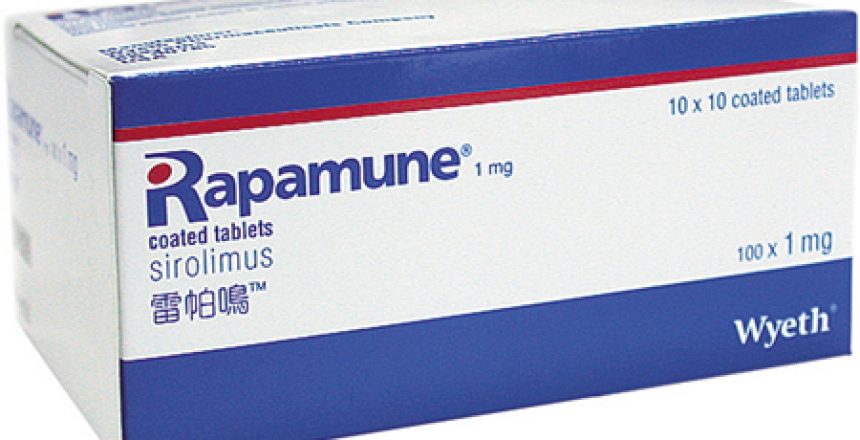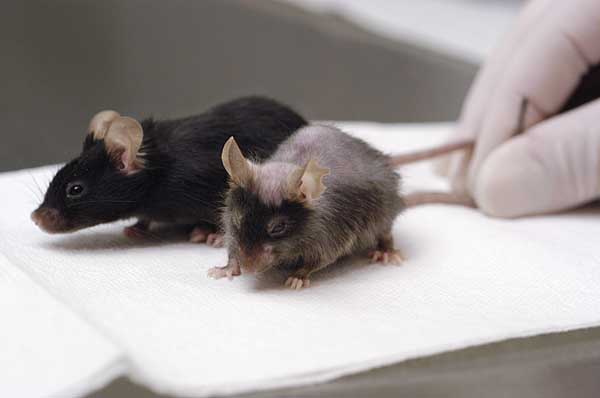I’ve talked to several people who take rapamycin for anti-aging purposes, and they’ve all reported that they lost weight when they started taking it. It appears that even a single dose of rapamycin induces weight loss, in lab animals.
Rapamycin alleviates obesity
A relatively low, intermittent dose of rapamycin alleviates obesity in aged rats. (Ref) Rapamycin lowers levels of leptin, the satiety hormone, by lowering body fat.
The response to rapamycin appears to be related to its peripheral inhibition of mTOR, since injecting it directly into rats’ brains had little effect. (Ref) The authors state,
“We speculate that the mechanism underlying these anorexic responses to peripheral rapamycin may be due to an initial peripheral action that communicates a signal to the hypothalamus that triggers an anorexic response to reduce food consumption.”
Single dose of rapamycin has long-lasting effects
Here’s where it gets really interesting, in my view: “Single Rapamycin Administration Induces Prolonged Downward Shift in Defended Body Weight in Rats”. (Ref) In this study, a single injection of rapamycin induced body weight loss that lasted at least 10 weeks, without further rapamycin administration.
The authors state it in terms of the rats defending a lower body weight set point.
The study found:
- rapamycin did not induce illness or malaise, important because if it did, that could account for weight loss
- rapamycin does not affect glucose tolerance, important because daily rapamycin does so
- rapamycin-treated animals had lower levels of body fat, although there’s no data for lean mass.
A brand new study shows that a single injection of rapamycin “blocks post–food restriction hyperphagia and body-weight regain in rats.” (Ref) When rats were food restricted and lost weight, rapamycin prevented weight regain.
These studies have obvious implications in obesity.
Obesity and aging
What’s perhaps more interesting is what rapamycin implies for the relation between obesity and aging.
As I’ve said many times, obesity and aging are two sides of the same coin. Obesity is aging in miniature; obesity promotes aging.
The converse is that aging promotes obesity. Older animals, including humans, are more likely to gain body fat, as well as lose muscle. The fact that rapamycin both extends lifespan and promotes lower body fat is telling, and agrees with observations on obesity and aging.
Body composition, that is, the relative proportions of lean mass to fat mass, are a solid target to slow aging.
And of course, diet, exercise, and other factors also affect body composition.
Perhaps mTOR, the mechanistic target of rapamycin, is critical to obesity. (Wouldn’t surprise me.)
Could rapamycin become a once-weekly anti-obesity drug?
A prominent scientist in this field, Matt Kaeberlein, has said that, in proper doses, rapamycin may be safer than aspirin. However, there’s no money in promoting rapamycin, since it’s off patent.














26 Comments
This is an interesting topic and one that deserves further studies. When I first started rapamycin I weighed 197 lbs. After three months of 2 mgs/ week dosing, I was down rather effortlessly to 181. This gradually went up to 184 where it hit a plateau and remained. This is very typical of drugs that downregulate the hypothalamic weight set point. There is an initial drop followed by a slight uptick, like a recalibration.
After about a year, I went up on my dose to4 mgs per week and my weight again dropped, this time to 178, but has once again settled in at 181. It now seems to be stable.
I have felt for some time now that obesity, which has a strong genetic predisposition, is just another age- related disease, so to the extent that rapamycin prevents ARD’s, it’s not surprising that it would have that effect on obesity as well.
Thanks for that feedback, Paul. Do you have any sense whether the weight you lost was pure fat?
Mainly fat as assessed by my bio impedance scale.
How does one obtain Rapacity? Are you utilizing a primary care, and just asking them for a script for general health benefits? Is thia available OTC?
Thanks
Rapamycin is prescription only, and most docs won’t prescribe it. But see here for one who will.
https://www.dropshipmd.com/
This site from India appears to be a reliable source. That’s what some people have reported on other sites anyway. There is also https://teamtlr.com/. TLR sells a powder and is more difficult to administer for a non medical person. I have personally been taking a once a week dose since June 2017, I have not noticed any discernible difference.
After several years of being rapa-curious I took the plunge about fourteen months ago after your world-rocking interview with Dr. Green. Over the first year of dosing about 2-3mg ever 10-14 days I lost ten pounds effortlessly. Weight loss seems to depend on previous metabolic condition. I had stalled after several years on a ketogenic diet, having lost 30 lbs and settling about 20% short of my ideal bodyweight. The rapamycin blasted through that set point, bringing me about 5% short of ideal bodyweight. After a couple of months hiatus from holy Rapa, I’ve increased my dose to 4mg and have already lost a few lbs. I’ve also put on a little muscle over the past year while taking Rapa. I just turned 60 this week and people are shocked to learn my age.
Robert – that’s an awesome comment, thanks. That’s the kind of data we need. Sounds like a pretty miraculous drug.
I’m a 72 yo male who has been taking Sirolimus 6 mg. weekly for over 2 years without any side effects. Blood work is excellent. Yes, it has helped me to maintain my weight as I have grown older, but my Sirolimus regime did not help me lose weight. My weight has stayed within 5 pounds up or down. I have met with Dr. Green so know how to take Rapa.
If you noticed in the 2014 study with the rats that a chronic dose of rapa was used. This is critical in order to lose weight with rapa. A single injection 8mg/kg helped the rats to reset there body weight set point in the brain. It takes a chronic dose to do this. In the Mannick study elderly patients were given 20 mg. weekly and they had side effects because the rapa never troughed before the next dose. On the second dose those patients had appx. 24-25 rapa in there system. So using this info, I took 20 mg. Rapa, but it did not seem to do much for me. So I waited 2 weeks for the 20 mg to trough then took a 25 mg. dose this time. There has been a noticeable difference this time. I could never get below 82 kg., but now weigh 80 kg. My appetite is less, but I feel that my metabolism has increased per the study. It has only been 1 week since I took the 25 mg. so will have to wait. Will wait at least a month before re-dosing to see my results. My plan is to only take the single chronic dose once a month, and maybe will find out that I can go even longer to 6-8 weeks between doses. Also, feel that rapa transistent treatment works well for ageing. This is an experiment, so I do not encourage others to follow my example.
I
The following was quoted from https://www.aging-us.com/article/101647/text
Rapamycin and other rapalogs
Rapamycin (Rapamune/Sirolimus), an allosteric inhibitor of mTOR complex 1 [63,66], is a natural rapalog as well as the most potent and best studied rapalog. Rapamycin-analogs such as everolimus, temsirolimus (a rapamycin prodrug) and deforolimus/Ridaforolimus are also now widely used.
Rapamycin, everolimus and deforolimus slow geroconversion [67–75]. It has been predicted that rapamycin would slow aging in mammals [10,76]. Starting in 2009, numerous studies have demonstrated that rapamycin prolongs life in mice [75,77–99], even when started late in life [77,78,97–99], or administrated transiently or intermittently [77,88,89,95].
In these studies, rapamycin was most effective at high doses [88,89,93–96,100–103]. Its effect and that of everolimus lingers after their discontinuation [104], even after a single dose [105]. What appears to be important is to reach high peak levels using a single high dose [93,94].
In non-human primates, chronic and/or intermittent rapamycin improves metabolic functioning [106]. In a randomized controlled trial, middle-aged companion dogs administrated rapamycin exhibited no further side effects as compared to dogs receiving the placebo [107].
Millions of patients with various diseases and conditions (e.g., organ transplant recipients) have been treated with rapamycin (Sirolimus). Typical dose of rapamycin in organ-transplant patients is 2 mg/day. Rapamycin in a single dose of 15 mg was administrated to healthy volunteers without adverse effects [108]. Similarly, a dose of 8 mg/m2 (around 16 mg) was also well tolerated in healthy male volunteers [109]. What is amazing is that the placebo group reported more “side effects” such as astenia than did the rapamycin group [109]. In yet another study, comparison to placebo revealed no real everolimus-induced side effects in the elderly [104]. Moreover, everolimus improves immunity [110] and reduces infections in elderly healthy humans [104]. In placebo-controlled studies, side effects of rapamycin and everolimus are manageable with dose reduction and interruption. Discontinuation due to toxicity was uncommon [111]. In volunteers (aged 70-95 years, mean age of 80 years), treatment with 1mg/daily of rapamycin for 8 weeks was safe [112]. Matt Kaeberlein suggests that conventional doses of rapamycin maybe sub-optimal for maximum life-extension [113]. I agree with this opinion.
Hi Kerry
I also read that study and have been toying with the idea of higher doses taken less frequently. It may well be true with rapamycin that a high dose is needed for optimal results.
Let us know how you do with the monthly high dose. I’m certainly interested in trying that approach as we’ll
Hi PD
Off topic question if you don’t mind.
I have a question which is more of a curiosity than a real issue: I’ve noted that nearly all “healthy” vegetables (like peas, carrots, onions, tomatoes, mushrooms) actually have as much sugar in them as a can of soda pop (not Coca Cola but less sugary variants eg carbonated “fruit” drinks). I couldn’t really believe it. Can they really be that unhealthy? Or are they healthy because of their “trace” minerals. In contrast I note that a can of beer only has 2.5g of carbs (not sugar per se) per 100ml. Are vegetables less good than beer when it comes to dieting? Grateful for your thoughts!
Best wishes
Hi Jer. The “sugar” is those vegetables are made of glucose, the sugar in soda is sucrose, and in beer, maltose. The vegetables have a lot of fiber which is counted as carbohydrate but is indigestible. For sure, starchy vegetables like potatoes contain a lot of glucose, but most of those you mentioned are fine if you don’t mind a few carbs. (Sorry for the delay in answering.)
Hi Paul,
Just got my lipid panel back. Ok, except for the Hypertriglyceridemia . Went from 110 to 490. Seems this is normal with Rapa. Will monitor in 1 month. Increasing my Statin from 5 mg. to 10mg. Crestor for a couple of weeks. Best treatment for lower triglycerides??
That’s one hell of a triglyceride level. Just to clarify, you were at 110 on your previous dose of rapamycin?
Yes 110. Chronic dose (25mg)of rapa shot it up.. Seems they see this a lot in transplant patients.. Should go back down as rapa leaves my system. See my other post
That’s an interesting result and would support the notion of lipolysis and subsequent weight loss from the high dose. You lost about 5 lbs. rapidly and that released about 17,500 fatty acid calories into your bloodstream, but the effect is transient and not uncommon. It would also be common to see an insulin inhibition and some increase in your blood glucose levels as well as a temporary breakdown of HDL particles and a lowering of that level also.
All of this is to be expected from your intervention and I wouldn’t panic over it since it’s probably transient. Merely re-check the levels about 4 weeks after your weight loss has stabilized and see what the numbers are at that point.
One of the studies you cited said that mice who had a cycle of rapamycin in middle age lived astonishingly long lives. The oldest mouse lived to the human equivalent of 140 years old.
Would taking rapamycin for a year at age 45 seem like a good idea?
Thanks for this article. Do you know of any rapamycin friendly doctors in the UK?
I’m afraid I don’t. I would assume there must be 1 or 2.
I have a Rapamycin prescription, and am experimenting with intermittent dosing. But I am skeptical Rapamycin makes it past the stomach,, it is a huge molecule.
I have used dropshipmd.com 5 times and have received high quality rapa from Bicon. 300 mg =$1.75 mg. +$8 shipping. Must wire money. Very good packaging, never a problem with customs in U.S.
I’ve also lost 5-8 pounds since I began the journey that I can’t otherwise explain. I can’t really identify where I lost the weight which is puzzling but my best guess is that I must have had some organ fat to lose, and losing it can only be a good thing.
(off-topic)
Feeding rats buckyballs almost doubles their life span,
and protects them from CCl4-induced liver damage.
https://docdro.id/W7ctKxT
For those experimenting with using grapefruit to increase the effect of rapamycin I came across the following research paper that investigated the effects in detail; https://www.oncologynurseadvisor.com/home/headlines/web-exclusives/grapefruit-juice-harnesses-power-of-sirolimus/
This can be summarised as;
1. Grapefruit juice increased the effect of rapamycin by 350% (x3.5) – they were targeting what was needed to get to an equivalent to 90mg dose by adding grapefruit juice for the purposes of treating cancer. The dosage needed with juice was just 25mg.
2. Grapefruit juice works by disabling an enzyme in digestion which results in an increase in bioavailability. Normal bioavailability is only 14%. The recommendations were to take 8oz 2-6 hours before consuming rapamycin.
3, They also noted that not all grapefruit juices were equal. They ‘solved’ this by standardising on a juice product so be aware that any juice you have may have a greater or lesser effect.
So people looking to take a larger irregular dose can combine with grapefruit juice to significantly reduce the costs.
I’ve (66yr) taken sirolimus for 2 years and the Dr. Green mediated ‘Rapamycintherapy.com’ treatment (+metformin, etc) for the last year and use grapefruit juice throughout for increased bioavailability to achieve blood concentration levels of about a ‘normal’ 5-6mg once a week. Having arthritis in my hands that responds well to sirolimus, I found Biocon pills to be effective even at higher weekly doses and have concluded they are not effective….I do not use Biocon dropship at all. Walmart version works very well.
I have noticed a significant noticable lowering of my overall resting body temperature and sensitivity to cold. Only moderate weight loss without any effort, good given the ongoing propensity to gain weight with age. My blood work (A1c, lipids, Insulin sensitivity, etc) are all good to excellent.